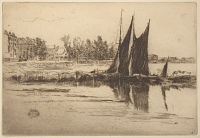Etchings Institutions search term: caxton club
Hurlingham | ||
| Number: | 184 | |
| Date: | 1879 | |
| Medium: | etching and drypoint | |
| Size: | 137 x 201 mm | |
| Signed: | butterfly at lower left | |
| Inscribed: | no | |
| Set/Publication: | Printseller's Association, 1879. | |
| No. of States: | 4 | |
| Known impressions: | 49 | |
| Catalogues: | K.181; M.178; W.147 | |
| Impressions taken from this plate (49) | ||
PUBLICATION
 ), third (
), third ( ) and fourth states (
) and fourth states ( ,
,  ) bearing the stamp.
) bearing the stamp. 6: Art Journal, 1879, p. 99.
7: The Athenaeum, 14 June 1879, p. 769 (our italics mark the relevant passage).
EXHIBITIONS
 ). 8 Impressions were for sale in exhibitions by H. Wunderlich & Co. in New York in 1898 and 1903, and by Obach & Co. in London in 1903. Charles Lang Freer (1856-1919) bought an impression from the 1898 show (
). 8 Impressions were for sale in exhibitions by H. Wunderlich & Co. in New York in 1898 and 1903, and by Obach & Co. in London in 1903. Charles Lang Freer (1856-1919) bought an impression from the 1898 show ( ). 9
). 9
After Whistler's death it was shown in the Memorial Exhibitions, including the Grolier Club in New York in 1904, and at the Copley Society show in Boston in the same year. H.R.H. the Princess Victoria lent an impression of Hurlingham to the Whistler Memorial Exhibition in London in 1905. 10 Probably she had been among visitors to Hurlingham to see polo played there.
8: Chicago 1900 (cat. no. 128).
9: New York 1898 (cat. no. 126). See REFERENCES: EXHIBITIONS.
10: New York 1904a (cat. no. 148); Boston 1904 (cat. no. 113); London Mem. 1905 (cat. no. 147).
SALES & COLLECTORS
 ). In 1898 Freer bought another impression from the collection of Francis Seymour Haden, Sr (1818-1910) through Wunderlich & Co. (
). In 1898 Freer bought another impression from the collection of Francis Seymour Haden, Sr (1818-1910) through Wunderlich & Co. ( ). In 1905, he acquired a first state: it had originally come from the collection of the late Joshua Hutchinson Hutchinson (ca 1829 - d.1891), and was bought at auction in 1892 by Thomas Robert Way (1861-1913) for £2.5.0 11 ; Way then sold it to Freer in 1905 (
). In 1905, he acquired a first state: it had originally come from the collection of the late Joshua Hutchinson Hutchinson (ca 1829 - d.1891), and was bought at auction in 1892 by Thomas Robert Way (1861-1913) for £2.5.0 11 ; Way then sold it to Freer in 1905 ( ).
). 11: Sotheby's, 3 March 1892 (lot 231).
12: Christie's, 13-4 July 1897 (lot 293).
13: William McAloon, Art at Te Papa, Te Papa Press, Wellington, 2009, p. 54.
 ); James Smith (1831-1923) (
); James Smith (1831-1923) ( ); Jules Gerbeau (d. 1906) (
); Jules Gerbeau (d. 1906) ( ) and James A. McCallum (1862-1948) (
) and James A. McCallum (1862-1948) ( ); and in America, Samuel Putnam Avery (1822-1904) (
); and in America, Samuel Putnam Avery (1822-1904) ( ); Howard Mansfield (1849-1938) (
); Howard Mansfield (1849-1938) ( ); Charles Deering (1852-1927) (
); Charles Deering (1852-1927) ( ) and Bryan Lathrop (1844-1916) (
) and Bryan Lathrop (1844-1916) ( ), both of whose prints went to the Art Institute of Chicago; Harry Brisbane Dick (1855-1916) (
), both of whose prints went to the Art Institute of Chicago; Harry Brisbane Dick (1855-1916) ( ); George Read Nutter (1863-1937) (
); George Read Nutter (1863-1937) ( ); J.L Claghorn (d. 1882) (
); J.L Claghorn (d. 1882) ( ); and William P. Chapman, Jr (
); and William P. Chapman, Jr ( ).
).
